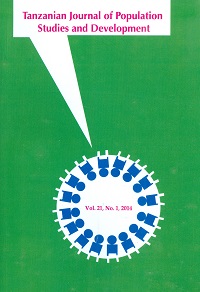The Impact of Extended Family on Household Poverty in Korogwe Township
Abstract
The objectives of this study, which was carried in Korogwe township, was to examine major constraints facing household members living in an extended family, identify number of households with extended and nuclear families, determine the number of dependants in households in an extended family, establish the contribution of extended families to household income and compare economic status between extended and nuclear families. The study adopted a cross-sectional design, administering a structured questionnaire to both members living in an extended family and nuclear family. It drew a representative sample of 120 respondents from a population of households in three wards, and analysed the resulting data statistically using SPSS, doing statistical tests using chi-square to test for statistical association between households with extended and nuclear family. The results show that household poverty influence the existence of extended family as people from poor families shift to moderate or wealthier families for assistance, or frequently request remittances. The study recommends reinforcement of a social welfare policy that can cope with the existing situation of extended families. There is also a need for education among heads households, especially on capital provision remittances as a coping strategy to problems that require frequent support from relatives. Furthermore, there is need for appropriate strategies to empower those who are in active labour but are not employed, especially in urban areas where employment is a big problem.
References
Ayad, M., B. Barrere, & J. Otto. 1997. Demographic and socio-economic characteristics of households. Demographic and health surveys (DHS) comparative studies. World Development Journal 25(2): 56-62.
Bailey, K.D. 1994. Method of Social Research. London: Free Press Collier Macmillan Publishers.
Bernard, H.R. 1994. Research Methods in Anthropology: Qualitative and quantitative approaches. London: Sage Publishing Inc.
Evans, R.M.C. 2005. Social Networks, Migration, and Care in Tanzania: Caregivers ' and children ' s resilience to coping with HIV/AIDS. Birmingham: University of Birmingham Press.
FAO. 2004. People ' s Participation: FAO ' s Small Group Approach. [http:www.fao.org/ waicent/faoinfo/SUSTDEY/FSdirect/FBdirect/FS006.htm] site visited on 12/8/2008.
Haviland, W.A. 2003. Anthropology. Wadsworth: Belmont, CA.
Karlenza, X.M. 1998. Confronting the social consequences of AIDS. Journal of Gender, Development and Poverty 6(10), 4 €“6.
Maneno, E., L. Nkya, C. Dube, & J. Decosas. 2000. The impact of HIV on the coping capacity of the extended family in Tanzania. In: Proceeding of International Conference on AIDS. 9 - 14 July 2000, Dar es Salaam, Tanzania.
NBS. 2002. Household Budget Survey 2001/2002. Dar es Salaam: Government Printers.
Ngware, S., & J.M. Kironde. 2000. Urbanising Tanzania: Issues, Initiative and Priorities. Dar es Salaam: Dar es Salaam University Press.
Pillitteri, A. 2009. Maternal and Child Health Nursing: Care of the Childbearing and Childrearing Family.
Rutasitara, L. 2002. Researching Poverty in Tanzania. Dar es Salaam: Mkuki na Nyota Publishers.
Stone, L. 2001. New Directions in Anthropological Kinship. London: Rowman and Littlefield Press.
TRCHS. 2001. An Assessment of the Trends in Child Mortality in Tanzania. Dar es Salaam: Mkuki na Nyota Publishers.
UNAIDS and UNICEF, 2002. Children on the Brink 2002: A Joint Report on Orphan Estimates and Program Strategies. http://www.usaid.gov/pop_health/aids/ Publications/docs/childrenbrink.pdf.
United Republic of Tanzania (URT). 2007. The Economic Survey 2006. Dar es Salaam: Government Printers.
€”. 2005b. Tanzania Poverty and Human Development Report. Dar es Salaam: Government Printers.
€”. 2005a. Concept and Definition for Official Statistics in Tanzania. Dar es Salaam: Government Printers.
€”. 2003b. The Labour Force Survey 2001/2002 Tanzania Mainland. Dar es Salaam: Government Printers.
€”. 2003a. Poverty and Human Development Report. Dar es Salaam: Mkuki na Nyota Publishers.
€”. 1998).The National Poverty Eradication Strategy. Dar es Salaam: Government Printers.
Williams, B., S.C. Sawyer, & C.M. Wahlstrom. 2005. Marriages, Families & Intimate Relationships. Boston, MA: Pearson.
World Bank. 2007. Development and Poverty. Hegemony University of Kwa Zulu-Natal Press.
€”. 2004. Tanzania: A Poverty Profile Report. Washington DC: World Bank Press.
€”. 2003. World Development Report 2003. Washington DC: World Bank Press.
€”. 1996. The Challenge to Reforms: Growth, Income and Welfares. Main Report. Washington DC: World Bank Press.


